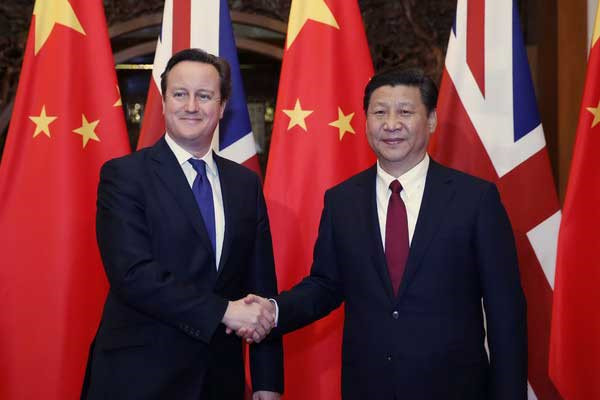

 |
| President Xi Jinping shakes hands with visiting British Prime Minister David Cameron in Beijing, Dec 2, 2013. (Xinhua Photo) |
BEIJING, Oct. 15 (Xinhua) -- President Xi Jinping is to pay his first state visit to the United Kingdom from Oct. 19 to 23.
Observers believe this UK trip, the first by a Chinese president in a decade, will usher in a "golden era" in China-Britain relations and lay a more solid foundation for China-EU ties.
MILESTONE
While meeting with his British counterpart Philip Hammond in June,Chinese Foreign Minister Wang Yi said Xi's UK visit will "raise the curtain for a golden era in China-UK relations."
British Prime Minister David Cameron also hailed 2015 as "a golden year" in the China-Britain relationship.
The Chinese president will stop over in London and Manchester. According to China's Foreign Ministry, the Queen will host a welcome ceremony for Xi and invite him for both an informal lunch and a formal dinner.
Xi is scheduled to hold talks with Cameron and also meet with leaders of opposition parties and the parliament.
In Manchester, the Chinese president will attend a banquet and visit research projects and local businesses.
Against the backdrop of a lackluster global economic situation, China is an undoubted engine of global economic recovery. The China-proposed Belt and Road initiative and the Asian Infrastructure Investment Bank (AIIB) have offered new platforms for bilateral cooperation.
Britain was the first western developed country to join the AIIB, the multilateral development body that will finance infrastructure building in Asia.
With 57 founding members, the AIIB is due to be formally established by the end of 2015.
Britain only receives two state visits every year, so Xi's visit demonstrates the importance both sides attach to their relationship, said Ruan Zongze, deputy head of the China Institute of International Studies.
"Xi's upcoming visit will not only cement China-Britain ties, but also lay a more solid foundation for the China-EU relationship," Ruan said.
PROPEL ECONOMIC, TRADE COOPERATION
According to the Chinese Ministry of Commerce, Xi's visit will see a number of deals signed between governments, financial institutions and enterprises in fields ranging from finance, real estate, energy to medicine and automobiles.
"This will demonstrate the characteristics and future direction of China-UK economic and trade cooperation," said Assistant Minister of Commerce Zhang Ji at a press briefing.
As the backbone of bilateral ties, the two countries' economic and trade relationship has enjoyed rapid development in recent years.
Britain is China's second-largest trade partner in the EU. Over 500 Chinese enterprises have set their feet there.
Two-way trade in 2014 exceeded 80.9 billion U.S. dollars, up 15.3 percent year on year. China's direct investment in Britain has grown to 12.8 billion dollars by the end of 2014, compared with 1.35 billion dollars in 2010.
The two countries plan to cement their investing relationship by stepping up cooperation in high-speed railway and nuclear energy projects, Zhang said.
During the seventh China-Britain Economic and Financial Dialogue in September, the two sides reached 53 agreements ranging from nuclear energy, high-speed railways to an expanded currency swap line.
As an important Western center for offshore RMB trading, London has witnessed strong growth in the RMB market, according to a report by the City of London Corporation.
"Both countries are highly complementary in their cooperation as Britain is strong in financial services, while China has strength in infrastructure with adequate capital, technology and experiences," Ruan said.
Britain has a huge need for improving its infrastructure, including renovating existing roads and railways, and building new high-speed railways and airports.
As China puts more emphasis on developing its service industries, it can learn from Britain.
"London boasts over 1.2 million highly-skilled service sector professionals, compared with 800,000 in New York and a combined number of 600,000 in Singapore and Hong Kong," said Wang Yiwei, director of the Center for EU Studies at Renmin University of China.
UPGRADE PEOPLE-TO-PEOPLE EXCHANGES
Xi's visit will also create an opportunity to upgrade the two countries' cultural and people-to-people exchanges, marking a highlight of the first China-Britain Cultural Exchange Year this year.
The two countries has held various activities during the year, including a creative industry show, a cultural trade forum and cell phone photo contest.
There are over 150,000 Chinese students studying in Britain and about 29 Confucius Institutes have been established there, more than in any other EU country.
Since the founding of the "China-Britain high-level cultural exchange mechanism" in 2012, the countries have seen vigorous exchanges in such areas as education, technology, media, sports, public health, tourism and youth.
During her visit to Britain in September, Chinese Vice Premier Liu Yandong said innovation cooperation is an important part of their comprehensive strategic partnership.
"Cooperation in innovation industry would be a new highlight in China-UK cultural cooperation, as China is boosting mass entrepreneurship and innovation and Britain has advanced experience in this field," Ruan said.
 Models change clothes on street in Hangzhou
Models change clothes on street in Hangzhou Night life in Qingdao
Night life in Qingdao In pics: army beauties across world
In pics: army beauties across world Photos of beautiful teacher hit the Internet
Photos of beautiful teacher hit the Internet Winding mountain road
Winding mountain road
 Math teacher makes 'solar powered electric car'
Math teacher makes 'solar powered electric car' Heavy traffic turns expressway into huge parking lot
Heavy traffic turns expressway into huge parking lot Chinese-American girl selected as Rose Parade princess
Chinese-American girl selected as Rose Parade princess Top 10 nominated designs at BJDW
Top 10 nominated designs at BJDW Spoilt students
Spoilt students Road to perfection
Road to perfection Firm reaction for US sea provocation
Firm reaction for US sea provocation Chinese firms eye UK high-speed rail project
Chinese firms eye UK high-speed rail projectDay|Week